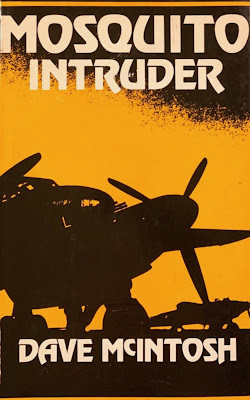I am definitely starting to sound like a broken record now: the editing work has not allowed me to get any review writing done recently. Anyway, as ever, I have had a guest review (or three) sitting around waiting to be published. Robert Brokenmouth, a regular ABR guest reviewer, sent this in over a year ago and it has taken me this long to remember to find a half-decent image to use as the cover. I have the later edition of Mosquito Intruder, retitled Terror in the Starboard Seat, and it is one of those books that I have always felt warm and fuzzy about at the prospect of eventually reading it. No pressure now to crank out a review now! Andy Wright
Now then. There aren’t that many books by the chaps in the Mossies who went into hostile territory at night to hunt Luftwaffe night fighters and the occasional target of opportunity. And there aren’t that many books on the aviation war in the Second World War that are actually funny, nor are there that many which focus on the fear felt by the aircrew; Mosquito Intruder ticks all three boxes and for that reason deserves a place on your shelf. And, if you’re one of those nutters who like to have at least one book by a veteran of every squadron possible, McIntosh was with No. 418 Squadron, so that will keep you happy as well.
Not sure what the reason for this is. Certainly Mossie night ops were regarded as ‘safer’ than night bombing by the ground staff, but get in your wayback machine and tell that to the young Dave McIntosh and you’ll get a disbelieving look.
See, young Dave is utterly bloody petrified most of the time and, to read him you’d think he was a mostly incompetent navigator. He (and his pilot) manage to arrive home safely (41 ops) and play this for laughs in the mess to their colleagues. The contrast couldn’t be more stark; while we, as parties interested in wartime aviation, are accustomed to reading hair-raising stories told with aplomb after the years have allowed fear to be stifled or forgotten (at least for an audience), McIntosh’s method offers a critical insight into the reality of that war.
I won’t speculate on the reasons for McIntosh’s obvious ongoing terror (particularly given the relative safety of the Mossie), but I will say that flying accidents while training would not have helped (especially one which could, simply, have happened to anyone). There’s also one particularly ghastly story which I won’t repeat, but it absolutely hammered me when I read it.
Also amusing is his description of him preferring women to have a large bust because otherwise they’re not worth bothering with; as we continue it becomes apparent that McIntosh is reflecting on his younger, more callow self from a distance of several decades.
That said, despite being an engaging and informative read, I also found it a bit lopsided, as if certain parts of the book were written at different times in the author’s life, or as if some parts were written, then edited before writing the rest. Speculation, of course; the lopsidedness comes from the combination of a rather flip way of expressing things as well as describing things more seriously.
But this is to carp, and anyway, I only have one actual moan and it’s to do with the publisher, not the book; in my copy, pages 62–63, 66–67, 70–71 and 74–75 are all blank – not good odds over 184 pages.
But such flaws in the publishing world are rare; Mosquito Intruder, or the later, probably better-known, edition Terror in the Starboard Seat, is a must have.
ISBN 978-0-71953-9-183 or 978-0-77373-0-892

